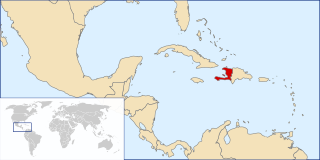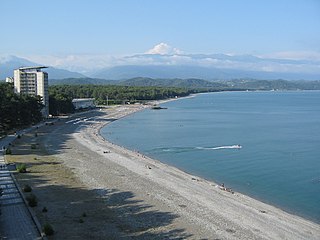
United Nations Security Council resolution 940, adopted on 31 July 1994, after recalling resolutions 841 (1993), 861 (1993), 862 (1993), 867 (1993), 873 (1993), 875 (1993), 905 (1994), 917 (1994) and 933 (1994), the Council permitted a United States-led force to restore President Jean-Bertrand Aristide and authorities of the Government of Haiti, and extended the mandate of the United Nations Mission in Haiti (UNMIH) for an additional six months.
Chapter VI of the United Nations Charter deals with peaceful settlement of disputes. It requires countries with disputes that could lead to war to first of all try to seek solutions through peaceful methods such as "negotiation, enquiry, mediation, conciliation, arbitration, judicial settlement, resort to regional agencies or arrangements, or other peaceful means of their own choice." If these methods of alternative dispute resolution fail, then they must refer it to the UN Security Council. Under Article 35, any country is allowed to bring a dispute to the attention of the UN Security Council or the General Assembly. This chapter authorizes the Security Council to issue recommendations but does not give it power to make binding resolutions; those provisions are contained Chapter VII. Chapter VI is analogous to Articles 13-15 of the Covenant of the League of Nations which provide for arbitration and for submission of matters to the Council that are not submitted to arbitration. United Nations Security Council Resolution 47 and United Nations Security Council Resolution 242 are two examples of Chapter VI resolutions which remain unimplemented.
An Agenda for Peace: Preventive diplomacy, peacemaking and peace-keeping, more commonly known simply as An Agenda for Peace, is a report written for the United Nations by Secretary-General Boutros Boutros-Ghali in 1992. In it, Boutros-Ghali responds to a request by the UN Security Council for an "analysis and recommendations" to strengthen peacemaking and peace-keeping. The document outlines the way Boutros-Ghali felt the UN should respond to conflict in the post-Cold War world.

United Nations Security Council resolution 812, adopted unanimously on 12 March 1993, after expressing its alarm at the humanitarian situation in Rwanda due to the ongoing civil war, in particular the number of refugees and displaced persons which posed an international threat to peace and security, the Council called upon the Government of Rwanda, the National Republican Movement for Democracy and Development, and the Rwandan Patriotic Front to respect a ceasefire that took place on 9 March 1993 and implement other agreements they had committed themselves to. It was the first resolution on the situation in Rwanda.

United Nations Security Council Resolution 813, adopted unanimously on 26 March 1993, after reaffirming Resolution 788 (1992) and determining that the situation in Liberia constituted a threat to international peace and security, the Council condemned the failure of the parties in the country – the Armed Forces of Liberia, ULIMO, National Patriotic Front of Liberia and Independent National Patriotic Front of Liberia among others, to implement the Yamoussoukro IV Accord.

United Nations Security Council resolution 814, adopted unanimously on 26 March 1993, after reaffirming resolutions 733 (1992), 746 (1992), 751 (1992), 767 (1992), 775 (1992) and 794 (1993) on the ongoing civil war in Somalia, the Council, acting under Chapter VII of the United Nations Charter, authorised an extension of the United Nations Operation in Somalia II until 31 October 1993.

United Nations Security Council resolution 827, adopted unanimously on 25 May 1993, after reaffirming Resolution 713 (1991) and all subsequent resolutions on the topic of the former Yugoslavia, approved report S/25704 of Secretary-General Boutros Boutros-Ghali, with the Statute of the International Tribunal as an annex, establishing the International Criminal Tribunal for the former Yugoslavia (ICTY).

United Nations Security Council Resolution 841, adopted unanimously on 16 June 1993, after recognising the need for an urgent settlement to the situation in Haiti and the efforts of the Secretary-General of the United Nations Boutros Boutros-Ghali and the Secretary General of the Organization of American States João Clemente Baena Soares, the Council placed various international sanctions on Haiti.

United Nations Security Council resolution 881, adopted unanimously on 4 November 1993, after reaffirming resolutions 849 (1993), 854 (1993), 858 (1993) and 876 (1993) concerning the Georgian–Abkhazian war, the Council extended the mandate of the United Nations Observer Mission in Georgia (UNOMIG) until 31 January 1994.

United Nations Security Council resolution 887, adopted unanimously on 29 November 1993, after considering a report by the Secretary-General Boutros Boutros-Ghali regarding the United Nations Disengagement Observer Force (UNDOF), the Council noted its efforts to establish a durable and just peace in the Middle East.

United Nations Security Council resolution 899, adopted unanimously on 4 March 1994, after recalling Resolution 833 (1993) and considering a letter by the Secretary-General Boutros Boutros-Ghali concerning the matter of the Iraqi private citizens and their assets which remained on Kuwaiti territory following the demarcation of the international boundary between Iraq and Kuwait, the Council, acting under Chapter VII of the United Nations Charter, decided that compensation payments may be remitted to the private citizens concerned in Iraq, notwithstanding the provisions of Resolution 661 (1991).

United Nations Security Council resolution 902, adopted unanimously on 11 March 1994, after receiving a report from the Secretary-General Boutros Boutros-Ghali pursuant to Resolution 880 (1993), the Council discussed confidence-building measures between the Republic of Cyprus and Northern Cyprus with the aim of resolving the Cyprus dispute.

United Nations Security Council resolution 910, adopted unanimously on 14 April 1994, after considering a letter by the Secretary-General Boutros Boutros-Ghali advising of his intention to send a reconnaissance team to the disputed Aouzou Strip between Chad and Libya, the Council decided to exempt the reconnaissance mission from a provision in Resolution 748 (1992) that imposed international sanctions on Libya.

United Nations Security Council resolution 915, adopted unanimously on 4 May 1994, after reaffirming Resolution 910 (1994), the Council, acting on a recommendation by the Secretary-General Boutros Boutros-Ghali, established the United Nations Aouzou Strip Observer Group (UNASOG) to supervise the withdrawal of Libyan forces from the Aouzou Strip following an International Court of Justice opinion that the strip formed part of the territory of Chad.

United Nations Security Council resolution 930, adopted unanimously on 27 June 1994, after recalling resolutions 772 (1992) and 894 (1994), the Council noted with satisfaction that a democratic and non-racial government had been established in South Africa, and terminated the United Nations Observer Mission in South Africa (UNOMSA).

United Nations Security Council resolution 1026, adopted unanimously on 30 November 1995, after recalling resolutions 982 (1995) and 998 (1995) on the United Nations Protection Force (UNPROFOR), the Council authorised an extension of its mandate until 31 January 1996.

United Nations Security Council resolution 1044, adopted unanimously on 31 January 1996, after noting the assassination attempt on President of Egypt Hosni Mubarak at an Organisation of African Unity (OAU) summit in the Ethiopian capital Addis Ababa on 26 June 1995, demanded that the Government of Sudan comply with OAU requests to extradite suspects sheltered in the country to Ethiopia.

United Nations Security Council resolution 1070, adopted on 16 August 1996, after reaffirming resolutions 1044 (1996) and 1054 (1996) concerning the assassination attempt on Egyptian President Hosni Mubarak at an Organisation of African Unity (OAU) summit in the Ethiopian capital Addis Ababa on 26 June 1995 and subsequent sanctions, the Council placed aviation sanctions on the Government of Sudan after its failure to comply with OAU requests to extradite suspects sheltered in the country to Ethiopia.

United Nations Security Council resolution 1072, adopted unanimously on 30 August 1996, after reaffirming all resolutions and statements by the President of the Security Council on the civil war in Burundi, the Council discussed efforts for a political settlement to the conflict in the country.

United Nations Security Council resolution 1090, adopted without a vote at a closed meeting on 13 December 1996, having considered the question of the recommendation for the appointment of the Secretary-General of the United Nations, the Council recommended to the General Assembly that Mr. Kofi Annan be appointed for a term of office from 1 January 1997, to 31 December 2001.

















